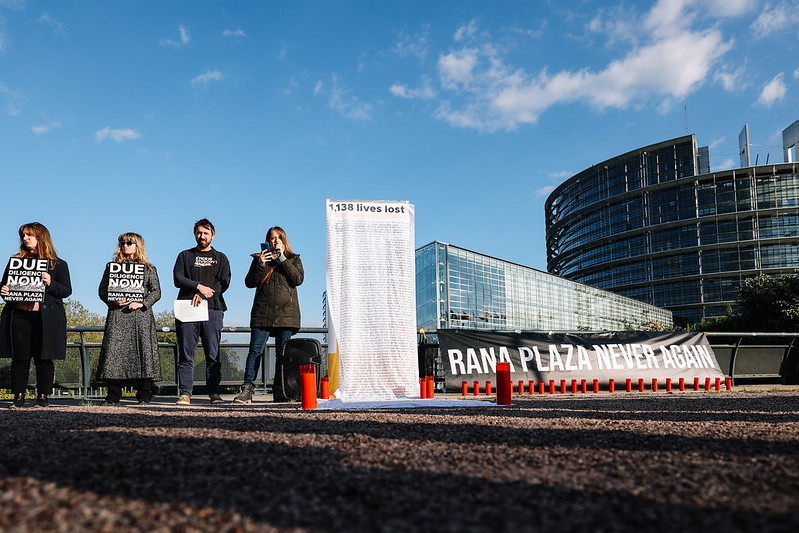
Compromise EU law will start holding companies accountable, 11 years after Rana Plaza collapse
In a landmark vote, the European Parliament approved the Corporate Sustainability Due Diligence Directive (CSDDD), a law representing a first step towards global value chains free from human rights and labour abuses as well as environmental harm. The text the Parliament green-lighted will cover only a very small minority of EU companies. The law also provides different enforcement options for Member States and avenues to remedy and justice for victims. However, the Directive still lacks rules removing obstacles victims face when they try to access justice in European courts. The final text does not include crucial International Labour Organisation’s (ILO) Conventions on Occupational Safety and Health, leaving workers in hazardous and potentially lethal conditions. Clean Clothes Campaign will continue to advocate for ambitious rules during the transposition of the law by Member States.
On the 11th anniversary of the Rana Plaza industrial collapse which killed 1138 workers and injured thousands more, the European Parliament approved in a landmark vote the Corporate Sustainability Due Diligence Directive (CSDDD). This law represents a first step towards global value chains free from human rights and labour abuses and environmental harm. The European Union is now the largest global market imposing mandatory human rights and environmental due diligence on large companies operating both domestically and abroad.
While the approval of the text represents a unique opportunity for workers in the garment and footwear value chains to see their rights respected, the version of the Directive approved by the Parliament is much less ambitious than the one agreed on at the end of trilogue negotiations of December 2023. In particular, the text the Parliament green-lighted today will cover only a very small proportion of EU companies, will leave out crucial parts of the value chain and contains significant gaps with regards to workers’ rights and the rights of victims
“MEPs have made history today as this law represents a groundbreaking change for how large companies operating in the EU, including fashion brands and retailers, will now have to do business” said Muriel Treibich, Corporate Accountability Coordinator at the Clean Clothes Campaign “yet, its impact will unfortunately be limited as many intermediary and smaller (but still large) operators will be able to escape their responsibilities and continue operating with impunity.” she added.
Crucially, the law also provides different enforcement options for Member States and avenues to remedy and justice for victims, including a civil liability regime. However, the Directive still lacks rules removing obstacles victims face when they try to access justice in European courts. “It remains to be seen whether in practice victims be able to make use of the civil liability mechanism and whether Member States will decide to address such issues during the transposition of the text into national law” according to Giuseppe Cioffo, Lobby and Advocacy Coordinator at the Clean Clothes Campaign.
Close to the finishing line, Member States also decided to reduce the extent to which the law applies throughout a company’s value chain, excluding post-consumer activities such as recycling, dismantling and landfilling. “This exemption fails to answer the demands of those calling for a just transition, one respecting the workers already in jobs that are crucial to move towards a circular economy” according to Giuseppe Cioffo, Lobby and Advocacy Coordinator at the Clean Clothes Campaign.
Moreover, despite efforts to enlarge the range of international instruments included in the law, the final text still does not explicitly include crucial International Labour Organisation’s (ILO) Conventions on Occupational Safety and Health. This will leave many workers producing clothes for European consumers at risk of working in hazardous conditions that may have catastrophic consequences for their lives, as the Rana Plaza disaster proved ten years ago.
Despite its flaws, the CSDDD marks a milestone in the fight to recognize the human rights and environmental impacts of corporate activities, and to reduce the toll the garment industry takes on workers and the environment. The Clean Clothes Campaign will continue to advocate for ambitious rules during the transposition of the law by Member States.
Press contacts
Giuseppe Cioffo, Clean Clothes Campaign: giuseppe@cleanclothes.org; +32 456 72 15 90
Muriel Treibich, Clean Clothes Campaign: muriel@cleanclothes.org; +32 471 64 09 34